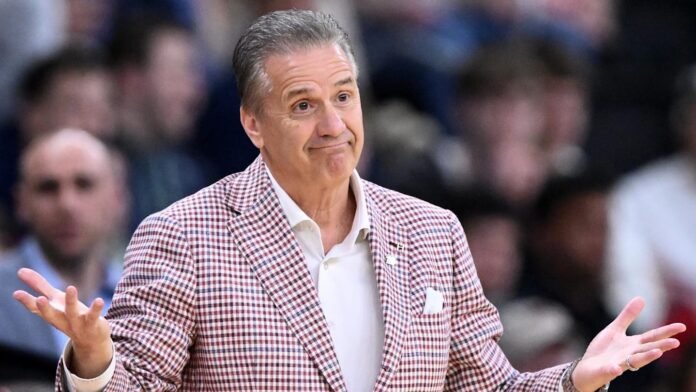FAYETTEVILLE, Ark. — Arkansas’ John Calipari doesn’t look like a coach who just left the blue-blood pressure cooker of Kentucky for a program in need of a new identity.
If anything, Calipari, who reclined into a podcast studio chair and chatted candidly with Memphis coach Penny Hardaway, sounded lighter, almost rejuvenated.
“I wanna help about 25-30 more families,” Calipari told Hardaway on the ‘Two Cents Podcast.’ “If I get to a point where I can’t have an impact because of this environment or I can’t coach the way I coach, then I won’t do it anymore.
“I don’t need to do this anymore. But I love doing it. I’ve got a new challenge.”
Arkansas basketball has been through a whirlwind, reshuffling its roster for the 2024-25 season after Eric Musselman’s departure.
The real story isn’t just about new faces on the court. It’s about Calipari’s arrival and his promise to create a culture where trust isn’t a buzzword—it’s the bedrock.
“I’m gonna tell the truth,” he said. “The reality of it is, for all of us, if you don’t have trust, you really don’t have anything.” That philosophy, honed through a Hall of Fame career, is now Arkansas’ guiding principle.
Calipari’s record is hard to argue with. There aren’t many other ccurrent coaches with 15 conference titles, six Final Fours, and a national championship. But he’s never been just about wins and losses.
“Winning” is a byproduct of his “Players First” approach, he insists, but the foundation is trust, honesty, and a relentless focus on player development.
“You can mold them and coach them and demand and make them uncomfortable as long as they know you’re who you say you are,” he explained.
In an era of roster churn and high-stakes recruiting, that message cuts through the noise.
This season, Calipari inherits a program that’s got some familiar faces and there’s hope in newcomers.
Arkansas brings back key contributors from last year’s Sweet 16 run in Trevon Brazile, Billy Richmond, DJ Wagner, and Karter Knox while welcoming impact transfers like Malique Ewin and Nick Pringle.
The incoming recruiting class is ranked sixth nationally, headlined by five-star guards Darius Acuff and Meleek Thomas, plus four-star local star Isaiah Sealy.
It’s a roster built for both the present and the future, shaped by Calipari’s blueprint.
But the environment Calipari steps into is very different from the one he left at Kentucky. The transfer portal and NIL deals have upended the old ways.
College basketball today is closer to professional free agency than ever before, with players empowered to move freely and capitalize on their brands (as explored in-depth by outlets like Forbes and The Daily Tar Heel).
Roster stability is rare, and coaches like Calipari are now expected to create winning cultures on the fly, sometimes in a single off-season.
Calipari doesn’t shy away from the challenge.
“Every other coach is looking out for themselves. I’m looking out for you,” he recently told recruits, echoing his open-door, player-first approach.
For him, the transfer portal is not a threat to culture but another weapon he’s adapted to using, blending experience and youth. It helps him keep the program competitive and relevant.
“I’m not doing it at the expense of the kids,” he told Hardaway.
Penny Hardaway, who has built Memphis into a program making headlines for the right reasons using a similar philosophy, sees a similarity in Fayetteville.
“It’s good for our game when coaches like John are pushing the envelope,” Hardaway said, looking forward to future Memphis-Arkansas matchups.
Their rivalry is less about animosity and more about mutual respect—and a shared vision for what college basketball can be. Hardaway’s approach mirrors Calipari’s.
The knock on Calipari has always been that he’s more interested in getting players to the NBA than hanging banners. He’s heard those criticisms and addresses them head-on.
“There are people who say, ‘He don’t care about winning,’” he said with a grin. “How about most NCAA wins? How about Sweet 16, Elite Eight, Final Fours in there? How about league champion? But ‘I don’t care about winning.’ How good would we be if I cared about winning?”
The SEC is loaded again, with Kentucky, Tennessee and Alabama projected to be really good again. For Arkansas, a return to the Sweet 16 is expected.
Calipari’s success will be measured by how well he can balance the demands of instant competitiveness with the slower work of building a sustainable, trusting culture.
Yet, as much as the numbers matter, the story is about whether Calipari’s culture-first philosophy can thrive in this new era.
Can trust and honesty survive the chaos of the modern game?
Calipari himself seems aware of both the opportunity and the risk.
“If I get to a point where I can’t have an impact, then I won’t do it anymore,” he said. For now, though, the impact is undeniable.
The Razorbacks are in the national conversation, the roster is stocked with talent. The sense of possibility is as high as it’s been in years.
But there’s still that nagging need for wins. That’s how the Hogs’ fans will judge things.






